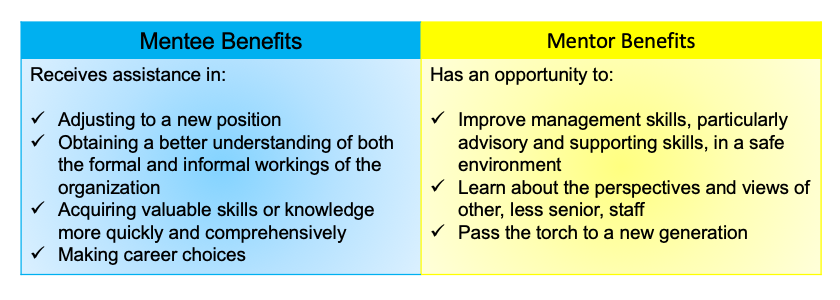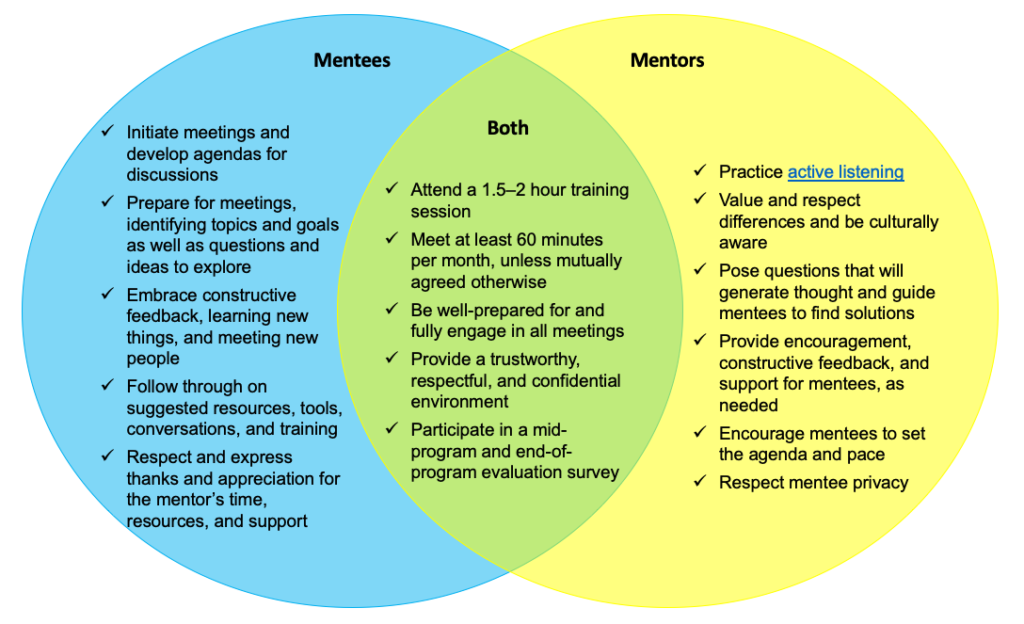 The Biosciences Area Mentoring Program is for employees and affiliates at any career stage who are either seeking career development, networking, or leadership advice, or are willing to share knowledge with others. Training and resources are available to all program participants. Program coordinators strive to find the best match possible for all mentees, including soliciting mentors from outside the Biosciences Area when possible.
The Biosciences Area Mentoring Program is for employees and affiliates at any career stage who are either seeking career development, networking, or leadership advice, or are willing to share knowledge with others. Training and resources are available to all program participants. Program coordinators strive to find the best match possible for all mentees, including soliciting mentors from outside the Biosciences Area when possible.
Program Coordinators:
Alex Degg, Biosciences Area Principal HR Division Partner
Nikki Humphreys, Biosciences Area Operations Deputy
What is Mentorship?
 Mentorship is a relationship in which a more experienced, knowledgeable person helps guide a less experienced or less knowledgeable person and in which one person professionally assists the development of another, outside the normal manager/subordinate relationship.
Mentorship is a relationship in which a more experienced, knowledgeable person helps guide a less experienced or less knowledgeable person and in which one person professionally assists the development of another, outside the normal manager/subordinate relationship.
Specific areas for mentorship may include:
General career development, scientific career development, communication, increasing organizational visibility, institutional knowledge, interaction with management, leadership development, networking, project management, supervisory/managerial skills, technical skills, work/life balance, or other topics.
It works best when both the mentee and mentor experience benefits.
Program Eligibility & Sign-Up Process
- Everyone is welcome to participate!
- All scientific, operations, technical, and professional staff and postdocs are eligible.
- Employees and affiliates can volunteer to be a mentor or sign-up to be a mentee. While every effort is made to identify a suitable mentor for all applicants, there are often significantly more requests for mentorship than mentors available. As a result, first priority is given to career and term employees.
- MENTOR sign-up form (open for calendar year 2024 in December)
- MENTEE sign-up form (open for calendar year 2024 in December)
- Mentors will be drawn primarily from the Biosciences Area but also from other Areas with whom we have partnered.
- Participants have the option when they sign up to state whether they prefer a mentor or mentee from within and/or outside the Area.
- Training is required for all program participants who have not completed training within the previous 24 months.
Matching Process
- The Biosciences Area Mentoring Program coordinators match mentors and mentees, guided by input from the sign-up form.
- Mentees indicate what abilities, skills, personality characteristics, and knowledge areas they would most like to see in a mentor (e.g., gender, years of experience, structured vs. informal meeting format, career goals, personal hobbies/interests).
- Where possible, program coordinators try to honor specific requests. However, specific matches can’t always be guaranteed.
- We often have more mentee requests than available mentors. We try our best to provide a mentor to everyone but it’s not always possible.
- Matches will be kept confidential and will not be disclosed to anyone outside the committee unless the mentor and mentee mutually agree to disclose their relationship to a third party.
- Mentees will not be matched with their supervisor or work lead.
- Job class and seniority will not play a role in matching unless these factors are explicitly identified as important in the sign-up form.
- Mentors and mentees meet one-on-one for the duration of the program.
General Program Timeline
- Early December: applications due
- Late December: partnership matches announced
- Late January/early February: program training (required for new program participants)
- July/August: mid-year check-in
- Mid-November: program feedback from current participants
Additional Resources
- Mentees
- Mentors
- 5 Tips for Setting Mentoring Objectives
- Coaching vs. Mentoring – 25 Ways they are Different
- Effective Mentoring Strategies – Say Hello to Mindful Listening
- Facilitating Mentee-Driven Goal Setting
- The Best Mentors Ask These 8 Questions
- From Diamond In The Rough To Shining Star; Becoming The Mentee Everyone Wants
- Both




